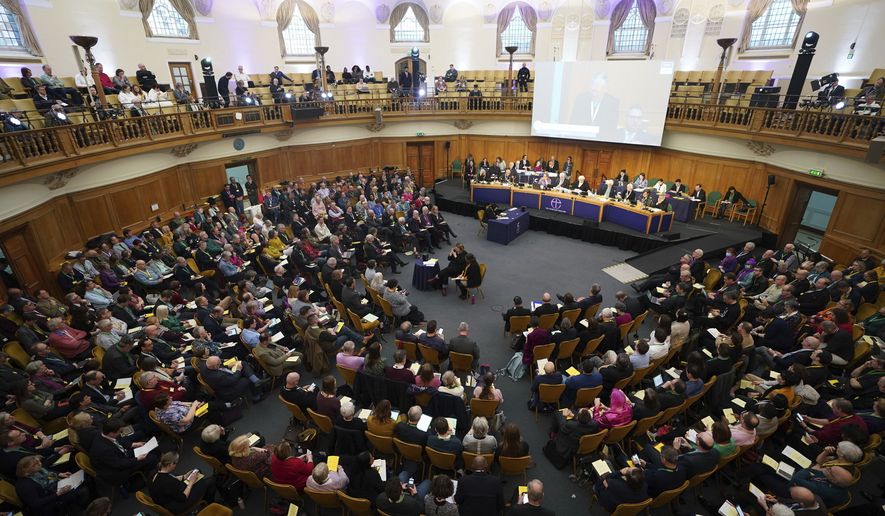OPINION:
The Church of England convened a synod this past week, a gathering of bishops, clergy and laypeople for the purpose of reviewing and possibly changing church doctrine.
The result of this particular gathering was that the national assembly voted, after two days of debate, to let Anglican priests bless same-sex weddings and civil partnerships. The blessings will come despite the fact gay and lesbian weddings will still be prohibited in the church.
Intended as a compromise measure after five years of discussions on the church’s position on human sexuality, the result is confusing to many. The ban on same-sex weddings is because the church believes it is sinful behavior, yet the church will now bless those same “sinful” partnerships?
That announcement wasn’t the most shocking to come out of the Church of England’s gathering, however.
The biggest news story to come out of the church’s gathering was that some within the Church of England are calling for 2000-year-old references to God as He, Him or Father to be banished, instead using gender-neutral or female alternatives.
Leaders at the synod took written questions from those attending. One question came from the Reverend Joanna Stobart, an Anglican minister, who wanted to know what steps were being taken to offer alternatives to God with male pronouns. Specifically, she hoped “to develop more inclusive language in our authorized liturgy.”
The Bishop of Lichfield, Michael Ipgrave, serving as Vice Chair of the church’s Liturgical Commission provided a reply that excited those seeking the change. “We have been exploring the use of gendered language in relation to God for several years in collaboration with the Faith and Order Commission. After some dialogue between the two commissions in this area, a new joint project on gendered language will begin this spring.”
The fact that The Church of England bills itself as a Christian church apparently isn’t slowing down this project intended to determine if the words of Christ should be believed or whether they should be tossed aside.
The story of Jesus Christ may be the best known and certainly the most read of any man to have ever set foot on planet earth. Christians believe Jesus was born to the ever-virgin Mary, sometimes referred to as “the mother of God.” She conceived Jesus through a miracle, thanks to the Holy Spirit. While some doubters have questioned her virgin status, virtually nowhere in history has there been any credible debate that Mary was Jesus’ mother. At no point has there been a serious discussion that Mary herself was God.
With those two points undisputed, it seems illogical that Christians could take to referring to God as She or Her. If one believes Jesus was the son of God and that Mary was His mother, and that she wasn’t God, simple logic tells us God can’t be referred to as She.
Far more importantly, though, are the words of Jesus himself. He spoke frequently about his Father in Heaven. He gave us the Lord’s Prayer, which begins with the words “Our Father.” He was not ambiguous.
Unless Jesus was lying to us, unless Jesus was intentionally misleading all of humankind, it seems incredibly arrogant to think that we know better, 2000 years later than the Savior. If Jesus was lying, or even if he was unintentionally mistaken when he referenced the Father, doesn’t that undermine the entire belief in him as the Son of God?
That is the quagmire the Church of England is leading itself into. In an effort to placate the current cultural whims of members of their clergy and laity, they would question whether Jesus, on whom their church is founded, was wrong. Toss out the Savior to fit the current cultural narrative.
No small irony, of course, and probably no coincidence, that the Church of England was created originally by King Henry VIII because of his own issues with sex and marriage. In 1536 King Henry wanted to get a divorce from his wife and marry his mistress. England was a Catholic nation at the time, and the Pope pointed out to Henry that trading in for a new wife was a no-no, even for a King. Unhappy that the Pope wouldn’t change the rules for him, Henry VIII and all of England left the Catholic Church. The King created his own church instead and then felt free to marry and carry on as he pleased.
Obedience to God and doing the right thing got lost somewhere in the process.
That’s where the Church of England finds itself again in 2023. There are some liberal Christians who, rather than adhere to 2000 years of scripture, four Gospels documenting the life of Christ, or to the words of Jesus himself, would rather change the rules. They want to do this because, like King Henry VIII, the change will make it more convenient for them and what they want.
Lost again is obedience to God and the serious study of scripture.
If the Church of England walks down the path of ignoring Jesus and instead referring to God in gender-neutral terms, it will have abandoned its role as a Christian organization.
• Tim Constantine is a columnist with The Washington Times.




Please read our comment policy before commenting.